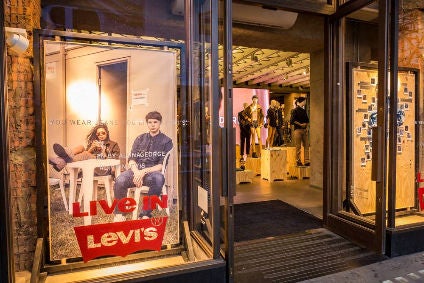
Levi Strauss & Co has outlined plans to slash its corporate workforce in a move expected to generate US$100m in annualised savings as the jeans giant has swung to a loss in the second quarter.
Speaking to analysts on the firm’s second-quarter earnings call, president and CEO Chip Bergh said the company has made the “difficult decision” to reduce its workforce by approximately 700 people, which represents about 15% of its global non-retail, non-manufacturing headcount.
“This will allow us to respond to the immediate business impact of Covid-19 and give us confidence in our cost structure during the potential extended recovery,” he told analysts.
“This is by far the most difficult aspect of this situation, made especially hard because we have been building such strong momentum before the pandemic hit. And many of our colleagues who are being impacted by this difficult but necessary reduction were critical to our success.”
In its earnings statement for the three months to 24 May, Levi Strauss said the coincidence of its fiscal quarter with the approximate ten-week temporary closure of the company’s and its customers’ stores in response to the Covid-19 pandemic resulted in a “significant adverse impact” to revenues, earnings and cash flows.
Bergh added in the statement the reduction in staff will enable Levi Strauss to become a “leaner and more market-responsive organisation” in addition to increasing its confidence in its cost structure, given what he called the “uncertainties” around the impact of the virus.

US Tariffs are shifting - will you react or anticipate?
Don’t let policy changes catch you off guard. Stay proactive with real-time data and expert analysis.
By GlobalDataHe noted the pandemic is accelerating retail landscape shifts and consumer behaviour in ways that “play to the strength of the Levi’s brand”, with the firm doubling down on its digital transformation, incorporating the power of artificial intelligence (AI) and data science, and leveraging its brands to have an even stronger focus on Gen Z and sustainability.
“We believe this will enable us to further grow our market leadership position and emerge from this crisis a stronger company,” he said.
Q2 results
The news comes as Levi Strauss posted a net loss for the second quarter of US$363.5m, compared to net income of $28.2m a year ago.
The group recorded $242m in incremental charges taken in connection with the pandemic, including $67m of charges related to the reduction in its non-retail, non-manufacturing workforce. Adjusted net loss was $192m, compared to an adjusted net income of $69m last year.
Gross margin, meanwhile, narrowed 19.2 percentage points to 34% from 53% in the same quarter of the prior year. The decline was primarily due to lower revenues across all regions and $87m in inventory-related costs recorded in connection with Covid-19 business disruptions.
Net revenues of $497.5m tumbled 62% on a reported basis and 61% on a constant-currency basis, excluding $41m in unfavorable currency effects. This compares to $1.31bn in the prior-year quarter.
The decline was due to the approximate 10-week closure of the substantial majority of the company’s and its franchise and wholesale customers’ retail locations in the Americas and Europe, as well as in most of Asia outside greater China and Korea as a result of the Covid-19 pandemic. By the end of May, only a portion of these doors had reopened.
The decrease was partially offset by the company’s e-commerce business which grew 25% for the quarter, with sequential month-over-month acceleration to nearly 80% growth for the month of May.
By region, net revenues tumbled by 68% on a reported basis in Europe to $129m, while in the Americas, net revenues were down 59% to $283m. In Asia, net revenues fell 61% to $86m.
Currently, about 90% of company-operated doors and franchisee doors have reopened globally, as well as the majority of third-party retail locations. While traffic and sales remain down to prior year, Levi Strauss noted weekly sales performance in company-operated doors is “sequentially improving”, as store sales productivity in the final week of June as compared to the prior year approached 80%, with nearly 40% of open company-operated store locations delivering positive net revenues growth compared to the same week in the prior year.
As store locations have reopened, the company’s e-commerce net revenues growth has remained strong, at close to 70% growth for the month of June as compared to the same month a year ago. Cash flow trends are also improving, as net cash flows from operations were positive in June.
Although trends appear to be improving sequentially, the ultimate health and economic impact of the Covid-19 pandemic remains “highly uncertain,” Levi Strauss said.
“The company expects that its business and results of operations, including net revenues, earnings and cash flows, will continue to be significantly adversely impacted for at least the balance of 2020, and there remains the possibility of additional Covid-19 related inventory and other charges.”




